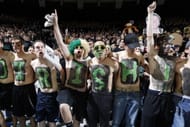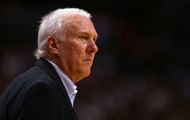Yesterday, I woke up at 6:30 am, despite only having slept three hours earlier. That’s what it means to be an NBA fan in India. On Sony Six, one of only three NBA games in the week, a potential NBA Finals match-up between two of the best teams in the league was to be telecast. A friend of mine, equally NBA crazy and a big Miami Heat fan, also barely slept in order to watch the match. We study in an educational institution with certain internet access restrictions, which means (while in college) we have no access to NBA games outside of a single TV in the hostel “common room”. Our circumstances are by no means peculiar to us alone. The target demographic of the NBA in India is under 30 years of age. There’s a reason why NBA India, during the recent 3×3, used DJ Nikhil Chinnapa and Anushka Manchanda to create an entertainment spectacle out of sports event. Our circumstances are probably mirrored in the plight of other college students who constitute India’s (relatively) minuscule NBA fan base.
We were really pumped about the game. The last time we watched the Heat take on the Spurs, the Heat had been blown out by 30-odd points. Since the television in our hostel wasn’t working, we rushed, one eye constantly on the time, to another hostel. We finally had TV access with 9 minutes left in the 1st quarter of the game. In about 30 seconds, all the excitement we had felt earlier had dissipated.
The Spurs, we realized, had a lineup on the court that did not feature their three stars – Tony Parker, Tim Duncan, Manu Ginobili – and instead fielded players who would struggle (on average) to beat the worst team in the NBA. “I’d been looking forward to this game all month,” my friend said, dejected and in a tone of resignation that encapsulated the NBA student-fan experience in India – a tangle of confusion constituted of trade-offs between classes and games, frantic searches for TV access, anticipation and excitement built up over weeks. Sports isn’t everything. But for us, access means more work and anxiety than most other fans. Slowly, over the next few minutes, it emerged that Gregg Popovich, the Spurs head coach, had benched his stars (all over 30 years of age) since this was their 4th game in 5 nights on the road. Pops had done what believed was best for his team’s health. And yet, half a world away, a few sore basketball fans couldn’t believe their bad luck. How can we take this game seriously, my friend asked. It shouldn’t have to be this way.
Explore the NBA Draft 2024 with our free NBA Mock Draft Simulator & be the GM of your favorite NBA team.
The NBA is driven by its fans. At its core, the sport is a corporatized business. It has to be. And the fans pay for everything through television, merchandise, tickets. The fans pay the NBA for a particular product. They are the primary stakeholders in this because without fans (and therefore money) the league would fail. The MIA-SAS game was nationally televised in the US (only a few games are each week). The two teams play each other only two times in the season. And, as we know, the game was internationally televised as well. International broadcasts, more often than not, tend to be these nationally televised games, which are primarily the marquee match-ups every night.
The NBA’s global presence (and revenue) has grown by double digits since the 1990s, by their own estimates. Their revenue is growing by 30-40% per year in China, even after global basketball superstar Yao Ming’s retirement. The league’s current television deal in the US is worth nearly $1 billion a year. According to the Financial Times, the NBA rakes in $250 million through International TV deals. The total International revenue – estimated at $430 million – constitutes nearly 10% of the NBA’s BRI (Basketball Related Income). Hyper-connectivity, digital media networks and truly global markets are the new reality of the 21st century. David Stern and the NBA have long indicated their cognizance of this and are aware that the biggest leaps in revenue are to be made in international markets in the coming years rather than the US domestic market. The international basketball fan, then, is not to be trifled with. He is the wave the NBA plans to ride into the next half-century. His demands are not to be taken lightly, because you do not want to alienate your biggest prospective market.
The NBA promises its fan – any fan – the best possible product. This is the contract implicit in any fair transaction – that the producer does not withhold shortcoming/flaws with the product deliberately in order to dupe his consumer. That would constitute business in bad faith. If the league as a whole has collectively agreed upon an 82 game NBA regular season, they are also saying, as far as possible, the best possible product will be on the floor for 82 games a team every season. The league has previously come under fire for scheduling too many regular season games driven by purely profit – Midas-like motives. The regular season is also seen by many within the basketball community as rather meaningless. Good health and good play in the playoffs is privileged, because the ultimate aim of each NBA team is to win a championship. This is predicated upon the fact that a team’s fans are satisfied when a team wins a championship.
It is this logic that leads coaches to rest their older players often during tough road trips or back-to-back games so they remain fresh for the playoffs. But the minute the quality of the product is compromised over the 82 games, the trust between the league and the fan is broken. A casual fan of basketball may watch due to any number of reasons: relaxation, for sheer love of the game, to see his personal favourite star. He may not necessarily care about a team’s championship mettle. Life, like basketball, is lived in the present for him. He’s paying for the here-and-now of it, not the wait-till-June fantasies. This fan’s importance is deliberately and wilfully undermined each time the NBA does not put the best possible product on the court. A counter-argument to this line of thought goes: About five teams every season are absolutely awful. Is that constitutive of unethical practice by the NBA? Here’s the thing: no product is perfect. Internet Explorer might crash all the time, despite Microsoft’s best efforts. That’s not a breach of trust, it’s imperfect engineering/business etc. In the case of the Spurs, they had an opportunity to put their best product on the court. And they didn’t.
The problem here is not Gregg Popovich. The league fined the entire San Antonio Spurs organization $250,000 for the incident, and it’s the fault of the entire organization. On a more macro-level, it’s a systemic fault. But the answer or solution here is not simply “Pops was trying to put his team in a best place to win a championship” or “Pops is the coach, let him run his team”, but that the primary stakeholders in the NBA are not being factored in for product decisions. This is not a choice Pops should have 1) made unilaterally and 2) had to make at all.
Firstly, the 82-game schedule is unquestionably ridiculous. All teams rest their stars to the end of the season. That’s more acceptable than what happened last night because the NBA fan is aware that games in April are often skipped/tanked and he makes his consumption choices based on this information. In fact, Pops said after the game that he knew he was going to rest his stars for this game when the schedule came out (before televised matches were announced). That being the case, the Spurs organization had an ethical obligation to inform its primary stakeholders that they would not be playing that game with their full squad. My friend and me would not have woken up for the game in all probability. We would hardly have been as excited. Fewer fans would buy tickets for that game expecting top-notch performance. The game would not, in all probability, be telecast on national/international TV. But that still does not make the skipping right. The league has long turned a blind eye to this without addressing its primary systemic flaw: they are cheating their fans if they keep asserting, despite contrary evidence, that they can put their best product on the floor for 82 games. Ideally, every team must play its best possible lineup in every game, and it is this outcome that the league – administrators on behalf of team owners – must make a reality, even if that means a 70 game season.
The NBA fan must demand the best, and understand the circumstances when he does not get it. He must have a “sense of entitlement” because that’s the scenario in which he is taken most seriously by the producers. If he sees bad quality basketball, he should take it in his stride, knowing the organization did everything possible, or tried hard, to give him a good time. The Spurs did not do that.
While the systemic flaws are debated, the Spurs organization would be better served with understanding business realities. The Spurs played in Orlando the night before Miami, and all their stars played. They won by over 30 points. That game was not nationally/internationally televised. If their stars had been rested for that game, the Spurs bench might have had a better chance of winning than against Miami. But Pops saw it differently – he saw a surefire win in Orlando, and an unlikely win (even with a full strength) team against a rested Heat squad. He didn’t see the kids who had gone to American Airlines Arena to watch that game – perhaps their only live game of the season. He didn’t, quite obviously, see the fans in a hostel common room in Chennai, India, awake at 6: 30 am and despondent. And no, it shouldn’t be that way.
Spurs Fan? Check out the latest San Antonio Spurs depth chart, schedule, and roster updates all in one place.

